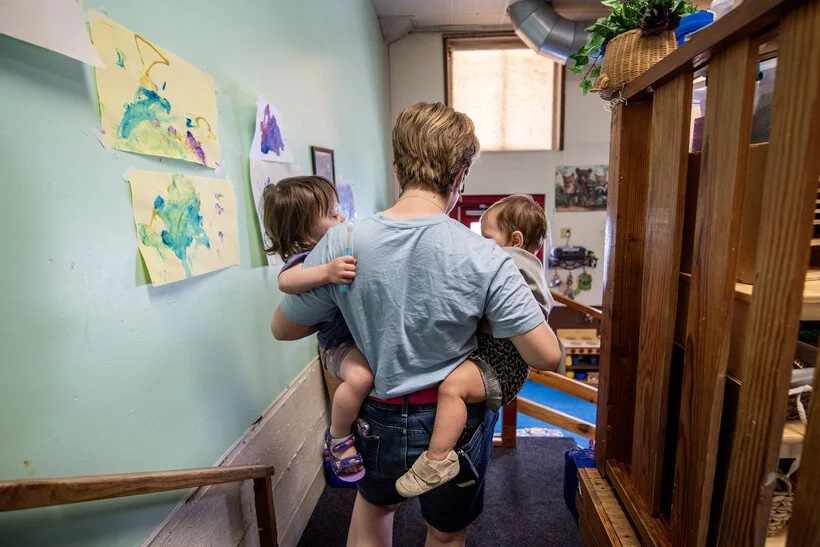Republican Child Care Bills Aim To Address Shortages By Cutting Regulations
Gov. Evers called for a Sept. 20 special session to address shortages, has different plan.

Teacher Morgan Cutler carries two children down the stairs Monday, June 19, 2023, at Red Caboose in Madison, Wis. Angela Major/WPR
Republican legislators hope to expand access to daycare by loosening restrictions on daycare providers, the proposals coming after they rejected Gov. Tony Evers plan to spend $340 million on the Child Care Counts program.
At a public hearing Wednesday on the five bills aimed at child care, most of the discussion focused on two issues – a plan to allow increased ratios of adult staff to children and infants in care and a proposal to allow 16-year-olds to work as assistant child care providers at daycare businesses.
Meanwhile, Evers called for a Sept. 20 special session to address child care shortages in the state.
Those who spoke at the hearing agreed on the problems in the industry – provider burnout, worker shortages, high demands for care, outdated infrastructure and low wages.
But there were few agreements on solutions.
Assembly Bill 390 would lower the age of assistant child care providers from 17 to 16. According to the Department of Children and Families, there are no other states in the Midwest that allow 16-year-olds in that role.
State Rep. Lee Snodgrass, D-Appleton said she spoke to a childcare provider in her district who told her the change would put children at risk.
“Children supervising children really creates a huge liability for a lot of child care businesses,” State Rep. Lee Snodgrass, D-Appleton, said. “This is a situation that might be unintentionally ripe for abuse and neglect.”
Carly Eaton is a mom of two children who attend daycare in Waunakee, a village outside Madison. She spoke against lowering the assistant child care provider age.
“Asking 16-year-olds to independently supervise small children is not a sustainable or safe solution to staffing challenges facing so many child care centers and providers across the state,” Eaton said.
State Rep. Joy Goeben, R-Hobart, and State Rep. Karen Hurd, R-Fall Creek, who cowrote the bills, defended their stance, saying lowering the age would help fill vacancies. They added that child care providers would maintain high standards for who they were bringing into their centers.
“Providers need to be aware of their staff. Who are they hiring? Is this a responsible person? How am I going to utilize this staff member?” Goeben said.
State Rep. Patrick Snyder, R-Schofield, chairs the Assembly Committee on Children and Families. He said he thought the proposed legislation would encourage young people to join the profession.
But Priya Bhatia, administrator for the division of early care and education at the Department of Children and Families, opposed lowering the age of assistant child care providers and loosening restrictions on ratios of providers to children.
“These proposed changes present some health, safety, and quality concerns,” Bhatia said.
Over half of Wisconsin is in a child care desert, meaning for every open child care slot available in a community, there are three or more children who need it, according to a report by the Wisconsin Early Childhood Association.
Statewide, 288,430 children have a potential need for child care. There are 171,040 slots available, according to the same report.
Pandemic-era funding called Child Care Counts helped alleviate some of Wisconsin’s child care issues but the program will end in January. Evers included $340 million to continue Child Care Counts in his 2023-25 budget, but Republicans removed the money.
During a press conference last week, State Rep. Cindi Duchow, R-Delafield, said the extra money during the pandemic gave people a “false sense of security.”
“I don’t think that, as conservatives, I want to pay for someone else’s child care,” Duchow said. “I paid for my own. I figured it out, and I think that everyone else kind of needs to figure it out too, that is a way that we can certainly help people.”
The first of the proposed GOP bills would create a loan fund to help providers renovate facilities to expand capacity.
Other proposals include increasing the maximum number of children group child care centers could care for, as well as changing the number of unrelated children a certified child care provider can care for at one time, allowing providers to care for up to six children under the age of 7 regardless of whether any of the children are related to the provider.
The bills would create a child care reimbursement account program similar to a health care flex spending account that parents could use to cover child care expenses on a pre-tax basis.
The final proposed bill would create a new category of licensed child care called Large Family Child Care Centers, which could provide care for between four and 12 children.
Listen to the WPR report here.
Editor’s note: Corrinne Hess contributed to this report.
5 Republican child care bills aim to improve daycare shortage by loosening some restrictions on providers was originally published by Wisconsin Public Radio.






















The one proposal RRRs (radical reactionary republicans) won’t agree to in the one proposal that is in keeping with capitalism, raise wages. Living wages attract more workers. This is not rocket science. In fact, it is the solution Adam Smith (father of Capitalism) proposed in his Wealth of Nations in 1776. By the way, Smith supported regulations that protect the interest of the least advantaged within a society. Shoving more poor children into unsafe centers does nothing to meet the needs of the least advantaged; not for urban or rural poor. Obviously, RRRs are not in favor of capitalism.,
Finally, for Duchow to claim that she, living in one of the wealthiest suburbs, was able to “figure out” how to pay for childcare, so everyone else should do the same, is as tone deaf, racist,, and in contradiction to the teachings of Jesus Christ (the teachings upon which Christianity is based.)